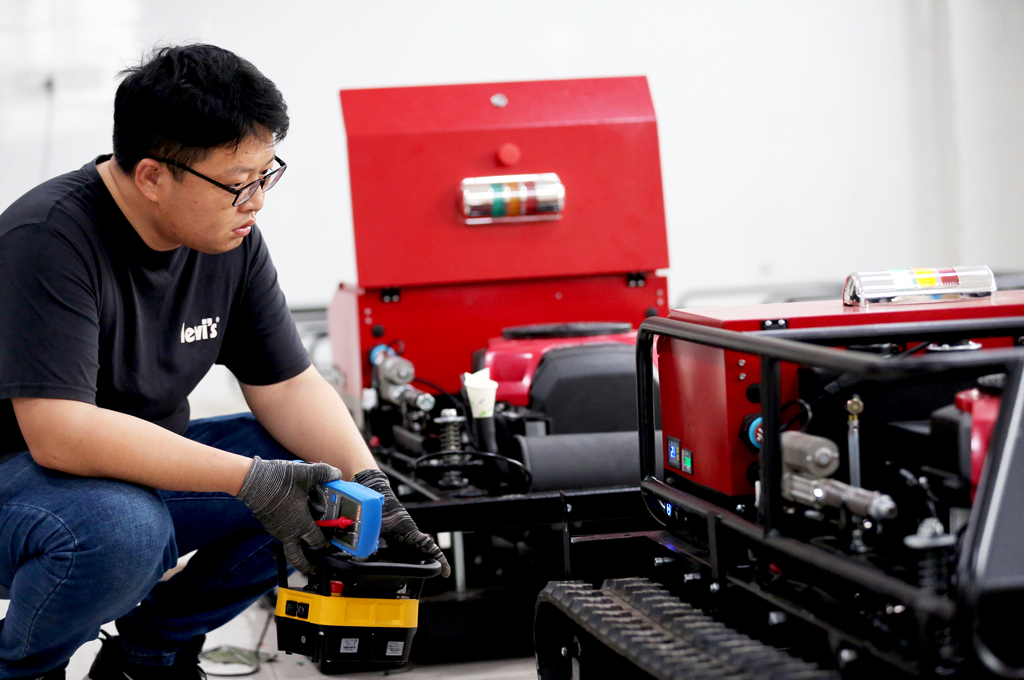Introduction
In the landscaping and grounds maintenance industry, efficiency and reliability are critical. As large commercial properties, airports, solar farms, and sports facilities demand consistent vegetation control, the commercial robotic lawn mower has emerged as a game-changing solution. In particular, hybrid power systems—combining traditional fuel with electric or solar technologies—are redefining the standards of productivity and sustainability.

1. Why Hybrid Power Matters in Robotic Mowing
Battery-powered mowers often struggle with runtime limitations, while fuel-driven machines raise concerns about emissions and long-term operating costs. Hybrid robotic mower technology bridges this gap:
- Extended runtime: Fuel ensures continuous power, while batteries provide backup during high-demand periods.
- Reduced downtime: Operators avoid frequent charging cycles.
- Lower emissions: Electric assistance reduces fuel consumption, cutting CO₂ output.
For commercial contractors managing hundreds of acres, these benefits translate directly into lower labor costs and improved ROI.
2. Key Features of Hybrid Commercial Robotic Lawn Mowers
Modern hybrid robotic lawn mowers incorporate advanced technologies designed for durability and large-scale performance:
- Dual power integration: Gasoline or diesel engines combined with high-capacity lithium batteries.
- Fuel-efficient design: Optimized engine load minimizes unnecessary fuel consumption.
- Solar-assisted operation: Integrated panels extend runtime, particularly effective in solar farm vegetation management.
- Smart navigation: GPS and AI-driven routing maximize coverage while reducing overlap. Learn more about robotic mower navigation technology.
3. Applications in Large-Scale Operations
The hybrid commercial robotic lawn mower proves especially effective in:
- Solar farms: Preventing shading losses by maintaining clear vegetation around panels.
- Airports and highways: Long stretches of land can be maintained without frequent refueling.
- Sports complexes and golf course : Consistent cutting height improves turf quality and appearance. For large areas, a golf course mower powered by commercial robotic technology ensures efficiency.
- Municipal landscaping: Parks and public spaces benefit from quieter, low-emission operation.
4. The Ideal Choice for Solar Farm Vegetation Management
In solar farm operations, vegetation management is critical. Weeds can block solar panels, create short-circuit risks, and reduce overall energy output. Traditional manual mowing is costly and inefficient, while purely electric mowers face battery limitations. Here, hybrid robotic lawn mowers deliver significant advantages:
- Extended runtime for large-scale work: For example, the MC700 hybrid mower runs over three hours on a single refuel, making it ideal for continuous operations in deserts, hilly terrain, and large-scale solar installations.
- All-terrain adaptability: A tracked design with powerful torque allows stable performance on slopes and uneven ground, surpassing the limitations of conventional equipment.
- Remote operation for safety: Operators can manage mowing from a distance, avoiding high-risk or densely vegetated areas while ensuring precise control.
- Low-noise and eco-friendly: Electric drive mode operates quietly with reduced carbon emissions, enhancing the green image of solar farms, agrivoltaics, and eco-friendly energy projects.
5. Cost Efficiency and Sustainability
Here’s a comparison between traditional mowing methods and a hybrid commercial robotic lawn mower:
| Cost Factor | Traditional Ride-on / Manual Mowing | Hybrid Commercial Robotic Lawn Mower |
|---|---|---|
| Labor Cost | High – multiple workers required daily | Low – automation reduces manpower needs |
| Fuel Consumption | High – 8L per day average | 30–40% lower with hybrid efficiency |
| Maintenance Needs | Frequent servicing & repairs | Reduced wear due to optimized load |
| Operational Time | Limited by labor shifts & fatigue | Continuous operation with hybrid runtime |
| Environmental Impact | High noise, high CO₂ emissions | Lower noise, reduced emissions |
| Overall ROI | Moderate to low | High – significant cost and time savings |
This comparison shows how hybrid mowers not only reduce operational expenses but also align with sustainability goals.
6. The Future of Hybrid Mowing Technology
As battery and renewable energy technologies evolve, hybrid mowing systems are expected to rely even more on clean energy sources. Key trends shaping the industry include:
- Wider adoption of solar-powered charging stations.
- Integration with IoT fleet management systems for real-time performance monitoring.
- Development of autonomous swarming technology, enabling multiple robotic mowers to coordinate tasks simultaneously.
FAQ: Commercial Robotic Lawn Mowers
Q1: What is the main advantage of a commercial robotic lawn mower with hybrid power?
A hybrid mower combines the runtime of fuel with the efficiency and low emissions of electric power, making it ideal for large-scale operations.
Q2: Are hybrid robotic mowers suitable for solar farms?
Yes. They prevent shading losses, run for hours without recharging, and operate quietly—perfect for solar farm vegetation management.
Q3: How much fuel savings can a hybrid mower achieve?
On average, hybrid systems reduce fuel use by 30–40% compared to traditional ride-on mowers.
Q4: Do hybrid robotic lawn mowers require human supervision?
Minimal supervision is required. Most models feature GPS navigation and remote-control options for safety in complex terrains.
Q5: Can hybrid robotic mowers operate on uneven or sloped land?
Yes. Tracked hybrid models are specifically designed to handle slopes, rugged ground, and irregular terrain safely.
Conclusion
The adoption of hybrid power systems in commercial robotic lawn mowers is more than a technological upgrade—it represents a shift toward smarter, greener, and more cost-effective landscaping. By balancing the strengths of fuel engines with electric or solar enhancements, hybrid mowers meet the demanding requirements of large-scale operations while supporting global sustainability goals.
For businesses looking to maximize performance without compromising on environmental responsibility, hybrid commercial robotic lawn mowers offer a practical and future-ready solution.


